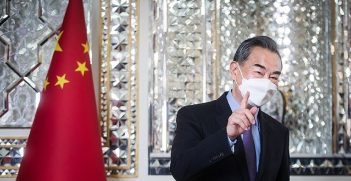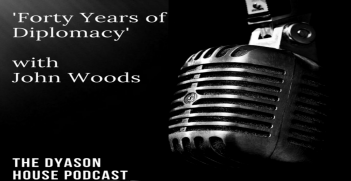International Broadcasting: Setting the Agenda

The Prime Minister’s announcement of $3bn for infrastructure investment in the Pacific was a missed opportunity to enhance Australia’s soft power through international broadcasting.
Today in Townsville, Prime Minister Scott Morrison announced a “step up” for Australia in the Pacific, including an Australian Infrastructure Financing Facility, a greater role for the Australian Defence Force and an expansion of Australia’s diplomatic posts.
Missing was a commitment to international broadcasting to the region. Instead the Prime Minister said he has been discussing with Australian commercial television interests how to get more Australian content broadcast in the Pacific, getting “Our pacific family switching on to the same stories, news, drama and sports we are watching at home.”
Contrary to Morrison’s apparent preference for content supplied by commercial media, a strong case can be made for the rejuvenation of state-funded international broadcasting: whether via radio, TV, online platforms, mobile telephony or through on-the-ground collaboration. This multi-dimensional activity is a proven practice in service of foreign relations.
In a report for the Australian Strategic Policy Institute (ASPI), Graeme Dobell, Jemima Garrett and I argue the contemporary rationale for international broadcasting based on a public service media model as a powerful soft power tool.
We do not seek a return to business-as-usual with the ABC, either in terms of traditional radio and TV or the organising principles behind them. The ABC remains the only organisation legally entitled to receive Commonwealth funding for international broadcasting. But, as Shadow Minister for Foreign Affairs Senator Penny Wong has urged, policymakers ought to think outside the square for options to renew Australia’s service to Asia and the Pacific.
Senator Wong spoke in the context of two concurrent government inquiries: the Review of Australian Broadcasting Services to the Asia Pacific and the Soft Power Review. These reviews present a generational opportunity for Australia to re-calibrate its approach to non-military power projection in a targeted, authentic and contextually appropriate manner.
So what might be defining markers of a reinvigorated commitment to international broadcasting, in a form that serves to model the robust character, values and interests of Australia as a secular democracy?
Focus
Unlike previous iterations of international broadcasting, this new investment would target foreign publics rather than Australian expatriates, who generally have ready access to Australian media via online and mobile platforms. It would reach out to opinion leaders and decision makers, as well as the politically influential, fast-growing and youthful middle classes of Asia and the Pacific. In PNG and the Pacific, the service would also target under-served communities in rural and remote areas.
It would identify audience targets by their socio-linguistic identities, not physical locations, thereby including Asia-Pacific diasporas. That calls for a serious commitment to multi-lingual output rather than reliance on English as a global language of the cosmopolitan elites.
Where Australia’s visibility remains low, as in a number of important Asian nations, the task is to become part of the public discourse and to help frame that discourse. Where relationships are based on pragmatism, rather than moral authority, the challenge is to convert that cognitive power into attractive engagement. Where there is attraction, opportunity presents to model the values and competence of our rules-based democracy.
The priority is not axiomatically to re-establish an Australian television network, especially one broadcasting only in English, which requires costly production and distribution infrastructure. It should be platform-agnostic, joining target audiences on those media platforms they use. The principal investment should be in skilled communicators with cultural intelligence, knowledge and experience of the region.
Values
There is ample evidence that the effectiveness and editorial credibility of international broadcasting hinges on it being allowed to operate independent of state-sponsored activities of self-promotion. At a time when all diplomacy has a public dimension in government self-representation, the role of international broadcasting becomes even more distinctive, modeling the robustness and authenticity of democracy.
Structure
Dobell, Garrett and I argue that the international broadcasting service should be re-constituted as a subsidiary corporation of the ABC with an independent skills-based board, including ABC representation.
Critically, the organisation must be equipped with a strategy core, supported by a strong research capacity, and allowed the prerogative to commission, acquire or produce content or services to suit a given situation.
The subsdidiary must be supported both to achieve long-term outcomes and be equipped to respond quickly to contingent events, whether natural disasters or viral outbreaks of social media disinformation. It must be a creature of the real-time networked world.
PNG and the Pacific
A primary focus of international broadcasting in the Pacific should be to contribute to peaceful region-building through respectful engagement with audiences and local counterparts. The editorial agenda would reference issues of national and regional development, helping connect Australia with widely-dispersed island societies.
Apart from the provision of core news and information, the Australian international broadcaster would give high priority to forms of on-the-ground collaboration: content sharing and personnel exchanges; content provision for redistribution or rebroadcast; active participation in social media discourse; and partnerships to strengthen media capacity.
Southeast Asia
A principal long-term task in engaging with key publics in Asia will be to address what past AIIA National President John McCarthy FAIIA calls the challenge of cultural divides in a region where many people continue to hold negative or unflattering perceptions of Australia. Of particular significance will be the fast-growing but still economically and politically vulnerable middle classes.
Through content agendas, and by example, the international broadcaster may strengthen awareness of this country as a multi-ethnic democracy, an open market economy with a skilled and competent workforce and a nation that is authentically engaged with the Indo-Pacific region.
Broadcasting as a crosscutting force
By influencing the agendas of public discourse, and through its framing of editorial coverage, a purposeful international broadcaster offers a platform that, over time, references the gamut of Australia’s interactions in the world. In that sense, it provides a metanarrative that acts as a kind of force multiplier for any number of political, commercial and cultural endeavors.
The Prime Minister’s reported wish to have Pacific audiences “switching on to the same stories, news, dramas and sports we are watching at home” begs the question, why bother? If the intention is to strengthen Australia’s reputation and influence in the region, international experience cautions against simply mirroring Australian media. The critical factor is not the supply of content as such but rather of perspective and the manner of engaging audiences in public discourse.
I have noted elsewhere there is a marked difference between spreading international culture and influencing an international outlook. The fact that an Australian program finds favour with international audiences does not mean those audiences will extend their approval to Australian values, mores or conduct.
Those who do not influence the setting of agendas, who cannot help frame public discourse and who fail to establish a sense of a shared world with those they seek to engage or persuade, are likely not to be heard.
Geoff Heriot is Director of Heriot Media & Governance Pty Ltd, a PhD researcher at the University of Tasmania and a former ABC corporate executive.
This article is published under a Creative Commons Licence and may be republished with attribution.





